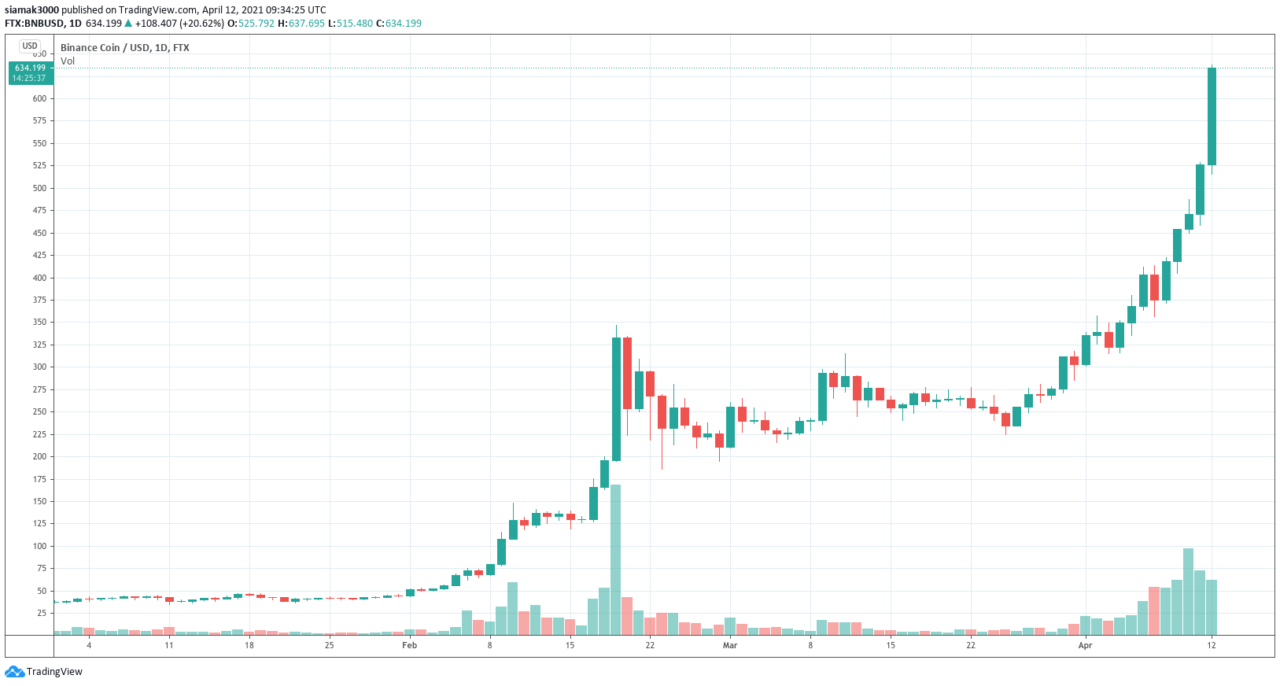On Monday (April 12), with two days to go until Coinbase Class A common stock starts trading on Nasdaq Global Select Market under the ticker symbol “COIN”, exchange tokens are doing well and none more so than Binance Coin ($BNB).
In fact, BNB has been on fire throughout this year. Thanks to the high gas fees and slow transaction processing on Ethereum, other less decentralized but faster and cheaper layer 1 (L1) blockchains such as Binance Smart Chain (BSC) have grown in popularity.
Data from TradingView indicates that on crypto exchange FTX the BNB price has gone from $37.42 at the start of the year to $631.00 (where it is as of 09:34 UTC on April 12), which means a gain of over 1,586% vs USD.
Over the past several months, as interest in crypto in general has increased, trading volumes on crypto exchange volumes have increased, which means increasing profits (from trading fees) for crypto exchanges.
For example, last Tuesday (April 6), Coinbase Global, Inc. announced “estimated results for its first quarter ended March 31, 2021 and an outlook for the full year ending December 31, 2021.” For Q1 2021, Coinbase estimates trading volume of $335 billion”, total revenue of approximately $1.8 billion, and net income of approximately $730 million to $800 million.
This announcement by Coinbase has helped to increase interest in exchange tokens since there are many people who want to make money from the growing popularity of crypto exchanges but are either not a fan of Coinbase or are not interested in investing in stocks. For these people, buying an exchange token such as BNB seems roughly equivalent to buying shares in Binance.
Since Coinbase’s announcement on April 6, the BNB price has gone from $367.75 to $631.00 (where it is as of 09:34 UTC on April 12), i.e. an increase of 71.58% (vs USD) in just six days.
If everything goes great for Coinbase on Wednesday (April 14) when its shares starts trading on Nasdaq, i.e. there is huge demand for the shares from investors, especially among those people who currently do not own any cryptoassets but would like to have some exposure to crypto, then the BNB price could continue on its upward trajectory.
If demand is only so-so, then in the short term, the BNB price could suffer a correction to $500 or $450. However, as long as Binance stays out of regulatory trouble, the long-term outlook for BNB remains bright due to the impressive way that Binance keeps growing its business.
Finally, it is worth mentioning that yesterday (April 10), Binance published a blog post titled “The Evolution of BNB: From Fees to Global DeFi Infrastructure”.
Here is what it said about BNB’s economic potential:
“It’s essential to understand where the economic potential of BNB as a utility token lies. Unlike security tokens, utility tokens don’t represent the company or organization’s value that issued them.
“Third parties who transact in and accept BNB impact the token’s value for its users. Owning BNB doesn’t represent any stake or share in Binance. By buying BNB, it’s essential to understand that you’re not actually investing in Binance. Simply put, a utility token’s value comes from its scarcity, sustainability, different use cases, and other factors…
“Thanks to the BNB Burn Plan, Binance prevents future inflation of BNB-denominated goods and services driven by an increase in the supply of BNB. Upcoming BNB burns reduce the circulating supply, thus making BNB scarcer…
“Scarce assets with added value tend to grow in price over time if the demand increases and supply remains limited. With BNB’s wide range of use cases, supply constraints, and massive community support, incidental appreciation of BNB may occur… In other words, the change in BNB’s value is driven mainly by two things: changes in supply from token burns and changes in demand from increased BNB use and acceptance.”
The views and opinions expressed by the author, or any people mentioned in this article, are for informational purposes only, and they do not constitute financial, investment, or other advice. Investing in or trading cryptoassets comes with a high risk of financial loss.










